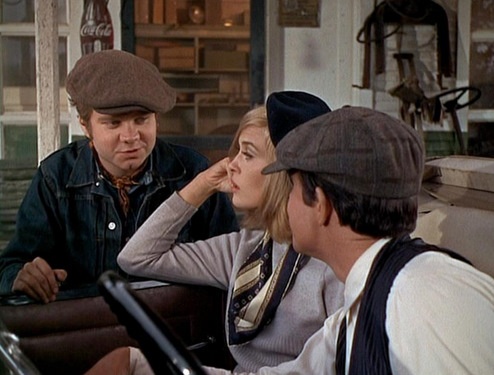Welcome to the first post of my new series, “What I Learned From Watching . . . “ I’ll be posting a different entry for the next few weeks about movies I’ve watched over and over again and what I’ve learned from each one. Several of these films I’ve seen more times than I can count through more than fifteen years of teaching screenwriting and film studies. I’ve also spent many hours discussing them with my classes, and reading about them.
These posts aren’t meant to be pieces of film criticism (though I do enjoy reading honest-to-gosh film criticism!), but very personal observations based on my own experience of these films and how certain things about them or ideas they contain have engaged/ empowered/ inspired/ affected me over time.
Feel free to comment! And now without any further ado—
What I Learned From Watching Bonnie and Clyde
Dir. Arthur Penn, 1967
1. Don’t park the getaway car.
After making C.W. Moss a member of their gang as go-to mechanic and wheel man, Bonnie and Clyde get out to rob a small town bank. C.W. makes the mistake of parallel parking the car while he waits for them to come out and when they do they can’t find him or the car and are caught out in the middle of a busy street with bank alarms going off and people are pointing, yelling and running after them as they scan the area for C.W.. As he struggles to get out of the tight parking space, knocking into other parked cars and further drawing attention to the situation, things escalate, and by the time Bonnie and Clyde finally do get into the car, one of the bank workers is hanging onto the side of the car, threatening to get them. Clyde, cornered, shoots the man in the face. Blood spatters in one of the more shockingly violent scenes for its time, and Clyde goes from bank robber to murderer in one split second. He’s devastated at the turn of events and berates C.W. in the next scene as they hide out in a movie theatre during the “We’re in the Money” number from Gold Diggers of 1933 while Bonnie momentarily escapes into the fantasy of the Busby Berkeley number and C. W. weeps quietly in shame.
C.W. turns out to be a valued member of the Barrow gang, but his inexperience upped their value as wanted criminals considerably and led to an innocent man’s death.
In today’s world, if you’re not a bank robber, the lesson here can be that lack of experience doesn’t mean a person isn’t qualified but they can’t read your mind either and will need some direction to function properly in your organization, especially in potentially touchy situations, until they learn the ropes.
2. Learn to stay focused in the midst of chaos.
In spite of his penchant for stealing, Clyde’s general affability makes him a likable character in the film, though not the brightest. If he hadn’t turned to a life of crime he’d be just another good ole boy. Earlier in the film, he gets nervous right before robbing banks but as he becomes more hardened he acquires nerves of steel which seem to serve him well in his profession.
After one of the most harrowing scenes wherein Bonnie, C.W., Clyde’s brother Buck and sister-in-law Blanche are ambushed by “the Laws” in an armored car and Buck is badly injured, Clyde is at the wheel, driving with a laser-like focus even as the screaming, crying and confusion ebb and flow all around him. Not as susceptible to panic as he might have been earlier, he stares straight ahead, unemotional. A rock.
During times of confusion and imminent melt-down, I often think of Clyde’s unswerving focus during this scene, his ability to shut it all out, hands on the wheel, eyes on the road, going forward—only going forward. Sometimes that kind of concentration is the only thing standing between you and total disaster.
3. People can change in big ways, but that doesn’t mean they will.
Near the end of the film, as Bonnie and Clyde are lying in bed, Bonnie asks Clyde what he would do if they could start fresh, clean, in a brand new place. At first one could interpret his expression as one of joy at the thought that it could ever be possible: the idea of a clean slate. Bonnie awaits his answer, a smile on her face. Clyde says that first of all, they wouldn’t pull their bank jobs in the same state where they live, but would go to other states before returning home to live their normal lives. Bonnie closes her eyes in resignation, without a word.
Bonnie and Clyde do love each other, but with Clyde’s answer Bonnie realizes that he is who he is and that’s who he’ll always be.
Their fate is sealed, and the words that conclude her own poem about them will come true: “Someday they’ll go down together; they’ll bury them side by side. For some it’ll be grief, for the Law a relief, but it’s death for Bonnie and Clyde.”

